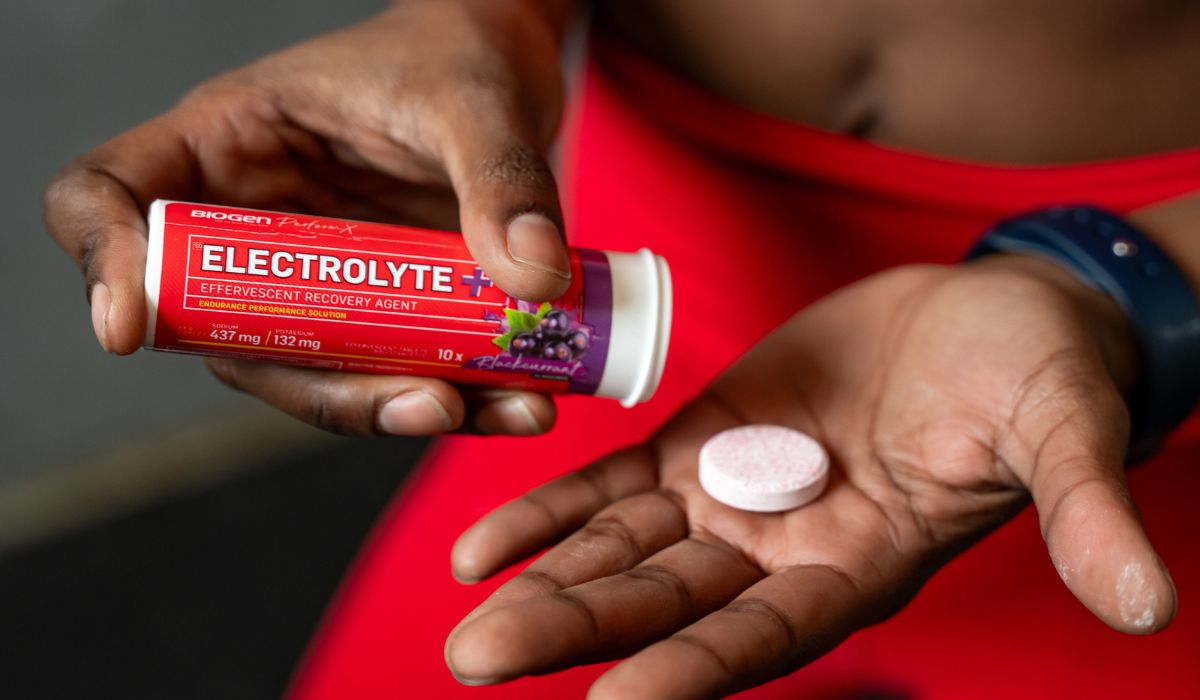
While it’s true that water is the essence of life and we need it to survive, optimal hydration is about more than merely drinking sufficient H2O – we also need vital electrolytes for the body to absorb the fluid we drink and support numerous bodily functions.
Electrolytes include various mineral salts, such as sodium, chloride, potassium, magnesium, calcium, and phosphorus. When dissolved in water, electrolytes separate into charged particles called ions that help carry an electrical charge in our bodies, which is needed in various physiological processes, including muscle contractions¹.
Crucially, electrolytes also help regulate the amount of water inside and outside our cells, which is vital for fluid balance¹. Maintaining this balance is crucial for proper muscle and nerve function¹ and optimal hydration¹. Keeping electrolyte levels in specific concentrations also helps regulate blood pressure².
Lost electrolytes
When we exercise, train or compete, we lose water (which comes primarily from our cells but also from blood and organs) through the sweat that pours from our bodies. What we often don’t see are the electrolyte minerals that leave our bodies in these beads of sweat.
The amount of sweat and electrolytes we lose during exercise is highly individualized and varies depending on multiple physical and environmental factors, such as the duration and intensity of activity, genetics, the clothing we wear, and environmental conditions like the temperature and humidity.
In general, though, the more we sweat, the more electrolytes we lose, which is why individuals who train hard or athletes in every sporting code can benefit from replacing these minerals.
Potential issues
If you don’t rehydrate with liquids that contain electrolytes, especially after sweating a lot, you can experience various issues that range from mild to potentially serious.
Dehydration is the most common consequence, as excessive sweat loss disrupts the body’s fluid balance. Losing electrolytes through excessive sweating can create an imbalance in blood concentrations, which may cause issues such as exercise-associated muscle cramps, and negatively impacts energy production within cells.
Electrolyte imbalances can also upset our digestive system, resulting in nausea and vomiting, and in severe cases, can lead to hyponatremia, a condition caused by a dilution of sodium in the bloodstream that can cause potentially life-threatening issues.
Replacing lost electrolytes
When we aim to rehydrate after exercise, it is important to consider that water from the tap or a bottle treated through distillation or reverse osmosis may lack sufficient electrolyte minerals, unless remineralised, and that water on its own has a low absorption rate compared to water consumed with a mineral solution.
As such, adding electrolytes to water with Biogen Electrolyte+ Effervescent Tabs or Biogen Hydrate Powder, or sipping on a supplement drink that contains added electrolytes, like Biogen Pure Energy, Biogen Cytogen Racing Mix or Biogen Complete 9 Aminos, will help replenish the essential minerals lost during prolonged or intense exercise in the gym or outdoor activities, especially in hot or humid conditions.
You can also replenish stores after your training session or race by consuming foods that naturally contain electrolytes. You can find chloride in tomatoes, celery, and olives. Sodium-rich foods include salted nuts, trail mixes, crackers, or pretzels. Bananas, citrus fruits, and dark leafy greens are high in potassium. Pumpkin seeds, almonds, cashews, peanut butter, and spinach are good sources of magnesium. And foods high in calcium include almonds, broccoli, kale, and sesame seeds.
To ensure you get sufficient electrolytes to support your recovery and rehydrate your body, Biogen has formulated a range of recovery products that contain these vital mineral salts, such as Biogen Pure Recovery and Biogen Recovergen.
Ultimately, replacing electrolytes through a combination of these sources is a sensible approach to optimise your performance, aid recovery and reduce the risk of dehydration and exercise-associated muscle cramps.
References:
- Shrimanker I, Bhattarai S. Electrolytes. 2023 Jul 24. In: StatPearls [Internet]. Treasure Island (FL): StatPearls Publishing; 2024 Jan–. PMID: 31082167.
- Iqbal S, Klammer N, Ekmekcioglu C. The Effect of Electrolytes on Blood Pressure: A Brief Summary of Meta-Analyses. Nutrients. 2019 Jun 17;11(6):1362. doi: 10.3390/nu11061362. PMID: 31212974; PMCID: PMC6627949.










